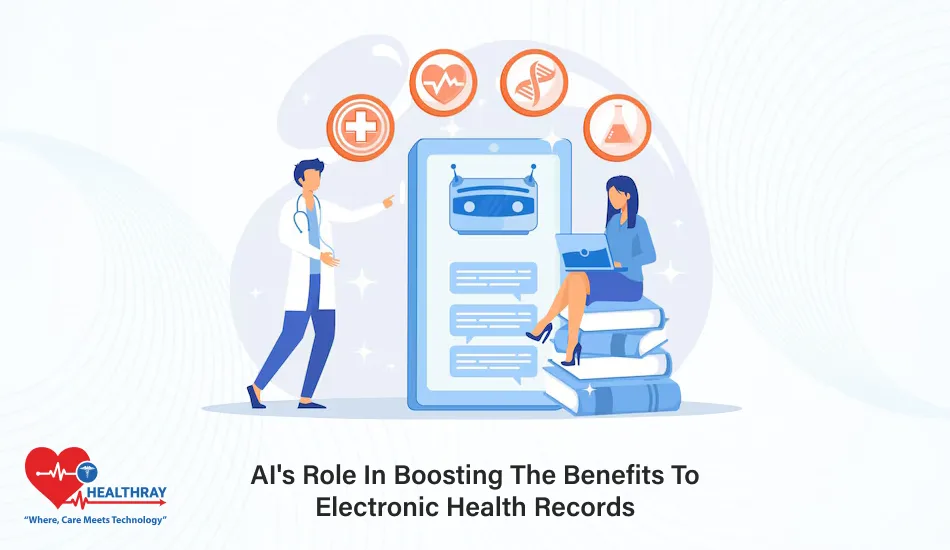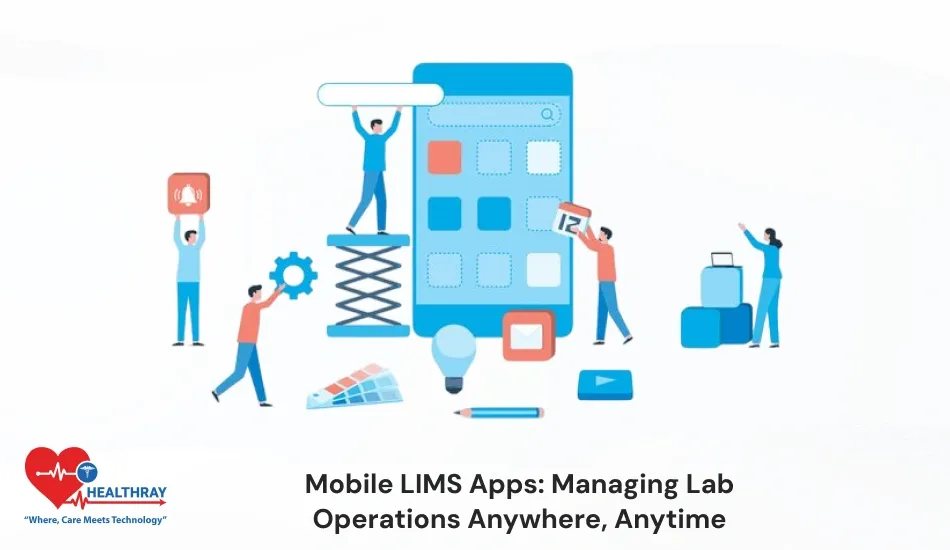EHRs revolutionized healthcare, bringing patient information online and making it more accessible. But most of today’s systems bring challenges in the way of complicated data entry, time-consuming workflows, and risks of burnout among clinicians. That is where AI makes all the difference.
AI brings automation, accuracy, and insight into EHR software; it confers real-world benefits, including smoothing operations, improving patient care, and easing the administrative burden on healthcare professionals. From predictive analytics to natural language processing, AI is changing how EHR systems work and empowering both clinicians and developers in equal measure.
In this article, we will consider how AI amplifies these EHR benefits by addressing aspects that range from efficiency to patient care, to the reduction in burnouts and to trends in the future. By the end of it, you should understand why integrating AI into EHR systems isn’t just an option; it’s the future of healthcare.
Improving EHR Efficiency Using AI
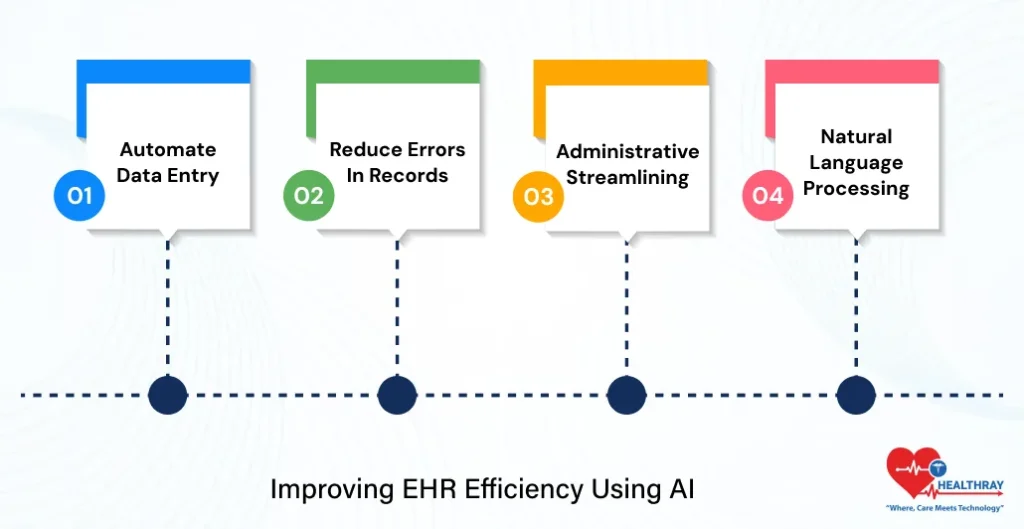
Of the biggest challenges EHRs face, one is in aspects of efficiency: most healthcare professionals find themselves bogged down with repetitive data entry and manual record-keeping tasks. Artificial intelligence offers practical solutions in automating processes and improving accuracy in handling data.
Automate Data Entry
AI-powered systems minimize manual entry by automatically capturing and structuring information about the patients. Technologies such as speech recognition make it possible for clinicians to dictate their notes and allow AI to transform those into structured entries in the EHR system. This saves time and reduces errors from manual typing.
Reduce errors in records
Mistakes in patient records could be very serious. AI algorithms find anomalies, flag inconsistencies, and make sure that the way information is entered follows protocol. The quality of the patient record will be much better, minimizing risks at the time of diagnosis or during treatment.
Administrative Streamlining
AI simplifies the workflow by collating information about the patient, prioritizing urgent tasks, and sending reminders to either follow up or proceed with the steps in critical care. The feature reduces cognitive burden among healthcare providers and gives them more time to take care of their patients.
Natural Language Processing
Another such game-changer is Natural Language Processing, wherein it takes the unstructured information contained in doctor’s notes or patient histories and integrates them into electronic health records in a meaningful manner. In this way, it ascertains that crucial information does not get left out, even if it is in an informal type of format.
But more than mere speed, AI makes things smarter. Automating mundane tasks frees the minds of clinicians to think about what really matters: patient care.
Improving Patient Care with AI-Enhanced EHRs
At the core of every Electronic Health Record system is a commitment to improve patient care. AI furthers that mission by providing sophisticated tools that let health professionals deliver more personalized, precise, and timely care.
Personalized Treatment Plans
AI works on data extracted from the EHRs, making the treatment plans more personalized. Hence, it considers past medical history and genetic information, along with present health data, while recommending therapies that are likely to yield better outcomes in individual patients. This personalization goes one step further beyond the usual one-size-fits-all approach.
Predictive Analytics for Early Detection
Predicting health problems, including ones that are up to years in advance of reaching critical status, is one of the strong suits of AI in health. Through studying the pattern in patient data, AI identifies early warning signs for heart diseases, diabetes, or even sepsis. Quite similarly, early detection results in timely intervention and improves recovery rates apart from reducing complications.
Smoothing Diagnostic Precision
AI-powered tools, therefore, sift through large volumes of data from imaging results and lab reports down to clinical notes to support diagnostics. This accelerates the process without even leaving out the most minute detail. In that respect, AI can highlight very small abnormalities in an image that usually evade the human eye.
Medical Error Reduction
AI-powered decision support strengthens clinical decision-making through cross-referencing of symptoms, medicines, and other clinical data to avoid potential errors. From suggesting alternatives for contraindicated drugs to pointing out tests that might have been overlooked, it acts as a safety net for the clinicians.
Empowering Patients
AI not only assists clinicians but also empowers patients. The AI-driven patient portal provides insight into medical records, treatment options, and follow-ups. Thus, better-informed patients are more engaged in their care, which results in better outcomes.
With AI capable of parsing out complex data and providing actionable insights, it’s little wonder health professionals are increasingly integrating these technologies into the treatments they provide.
Reducing Clinician Burnout
Today, clinician burnout is a growing concern in healthcare, and at the center of most discussions are electronic health records as being among the major causes. Administrative burdens with regard to data management overwhelm health professionals. AI offers solutions that could alleviate such pressure and give clinicians more time and energy to attend to patients.
Simplify Documentation
Other AI-enabled tools automate this process of documentation by converting spoken or written notes into structured entries in the EHR. Speech recognition allows clinicians to simply dictate updates about their patients. The process saves time and is less stressful.
Prioritizing Tasks
AI allows the analysis of patient records to identify urgent tasks automatically and sets priorities. It flags high-risk cases and sorts workflows, freeing clinicians from having to sift through an extensive record just to see what needs immediate attention.
Reduce Administration Time
Other frustrations include repetitive tasks such as billing or coding. These are administrative tasks that AI can assume and lighten the load for the clinicians. This shift in workload frees the clinicians’ schedules to interact more with the patients and provide patient care.
Providing Decision Support
AI-enabled clinical decision support systems now help in real-time, suggesting diagnoses or treatments based on data within a patient’s record. They have not replaced clinicians but have become valuable adjuncts through trusted second opinions, thus limiting the mental burden of making decisions.
Smoothening Work Processes
AI organizes data in such a way that it is easier to navigate; therefore, clinicians spend less time searching for the data. Speedy access to relevant patient data would help smooth their day-to-day operations and lessen frustration.
Offer Predictive Assistance
Thus, AI will support clinicians to take proactive actions based on the prediction of certain patient outcomes or complications, further helping in the improvement of the quality of care and making clinicians feel more in control of difficult cases.
Because AI can address these general pain points, it’s turning EHR systems into tools that support, not burden, clinicians. That’s a key step in building a healthy, productive work environment for healthcare.
Technical Integration of AI in EHR Systems
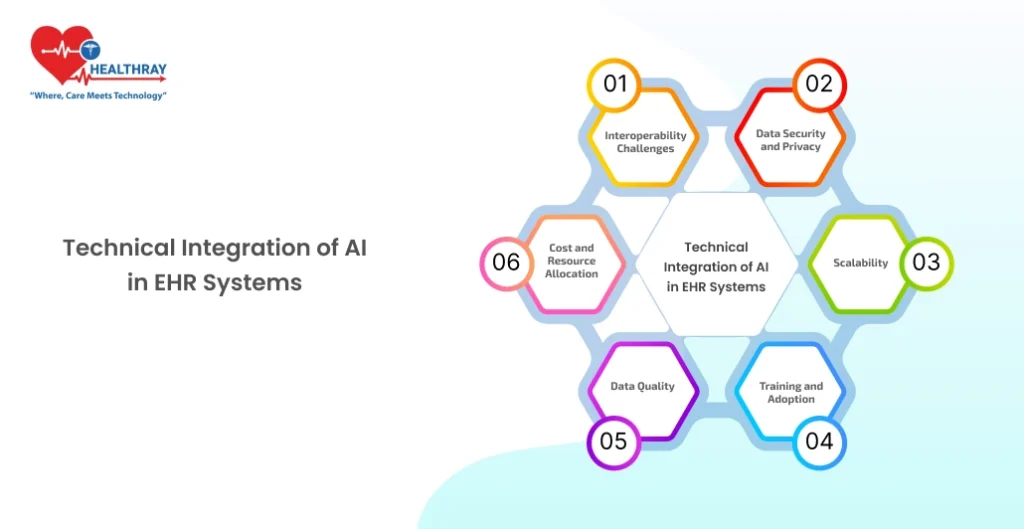
Artificial Intelligence integration with Electronic Health Records is not without its challenges. The right approach is what will make the difference in surmounting these issues and providing seamless, efficient, and secure solutions.
Interoperability Challenges
Among the major challenges, however, is integrating AI with the various EHR platforms, as many are built on different frameworks. To make this work seamlessly between systems, AI solutions will need to be flexible in communicating via the various available platforms.
The solution will enable interoperability through open APIs and the standardization of data formats. These tools will grant access to information on different EHR platforms to the AI models and allow processing without any problems from a compatibility perspective.
Data Security and Privacy
The integration of AI raises a lot of concerns regarding security and confidentiality as far as sensitive patient data is concerned. In the event of a breach or unauthorized access, serious legal and ethical implications could result.
AI solutions must adhere to healthcare regulations, such as US HIPAA and the EU’s General Data Protection Regulation. Advanced encryption, multi-factor authentication, and periodic audits are expected to safeguard patient data.
Scalability
Health systems vary in size and complexity; therefore, appropriate scaling of AI solutions has to be done from the small clinic level up to large hospital networks.
This modular design for AI makes it possible for an organization to deploy what it needs but easily scale up when the need arises.
Training and Adoption
The integration of AI into EHR systems often requires training for clinicians and IT staff, many of whom have little to no familiarity with the technology. Resistance to change often slows adoption.
A clear explanation of the benefits of AI, combined with practical training, ongoing support, will help healthcare teams become confident in the use of tools powered by AI.
Data Quality
AI systems are only as good as the data they get-inconsistent or incomplete records of patients limit how useful the AI-powered tools can be.
Solution: Data validation processes ensure the quality of the inputs. AI can complement this too in bringing to light the gaps or errors in the data prior to analysis.
Cost and Resource Allocation
These include investment in the technology at the outset, costs of implementation, and ongoing maintenance. The cost is considered to be a constraint for many organizations.
Solution: Emphasizing the long-term cost-saving benefits of AI-like reducing manual labor, improving operation efficiency-may justify the initial investments in AI.
In spite of these challenges, the potential of AI in EHR systems is enormous. All these benefits can be unleashed by healthcare organizations through some thoughtful planning without compromising on security, efficiency, or usability.
Case Studies and Real-World Applications
Artificial Intelligence integrated into Electronic Health Records is no longer a concept of the future; it’s a fact that brings quantifiable benefits to healthcare facilities all around the world. Here are some leading examples of the contribution made by enhanced EHR systems employing AI.
Improving Diagnostic Accuracy
Case Study: One of the major hospital networks in the United States implemented a hospital information system with AI-enabled diagnostic tools. By analyzing symptoms and using historical data, the AI was able to suggest probable diagnosis and additional testing. Over the past year-plus, this has improved diagnostic accuracy by 25% while reducing the number of misdiagnosis cases to an absolute minimum.
Reduce Administrative Workload
Case Study: One mid-sized clinic applied an AI-powered tool that automated all the billing and coding tasks within the EHR. That system utilized natural language processing to scan through clinical notes and suggest appropriate billing codes. The time that staff had previously spent on administrative work was reduced by 40%, freeing up more hours to focus on patient care.
Predictive Analytics for Early Interventions
Case Study: The integrated EHR AI system at a certain European hospital applies predictive analytics to determine the patients at high risk of developing sepsis. Thus, this system can handle patient information in real time and provides early warnings on potential cases, several hours before the onset of symptoms critical for the definition of sepsis. This form of intervention therefore reduces sepsis mortalities by 20%.
Simplifying Clinical Workflows
Case Study: A large Asian health provider was deployed in the use of AI in smoothing clinical workflows; it listed tasks in order of acuity level among patients and advised on the best pathways to care. Clinicians reported better workflow management, showing a noticeable reduction in six months from burnout.
Patient Engagement
Case Study: A Canadian hospital implemented AI-driven patient portals within its EHR. These provided personalized health insights, medicine reminders, and follow-up notifications. Patient satisfaction increased by 15%, and a significant improvement was recorded in adherence to treatment plans.
Supporting Population Health Management
Case Study: The Australian governmental healthcare initiative employed AI-driven EHRs in support of monitoring chronic disease trends within different population cohorts. By analyzing aggregated data, the system helped in mapping high-risk groups and further assisted in resource allocations to create better outcomes related to the management of chronic conditions such as diabetes and hypertension by 10%.
Future Trends and Opportunities in AI-Enhanced EHRs
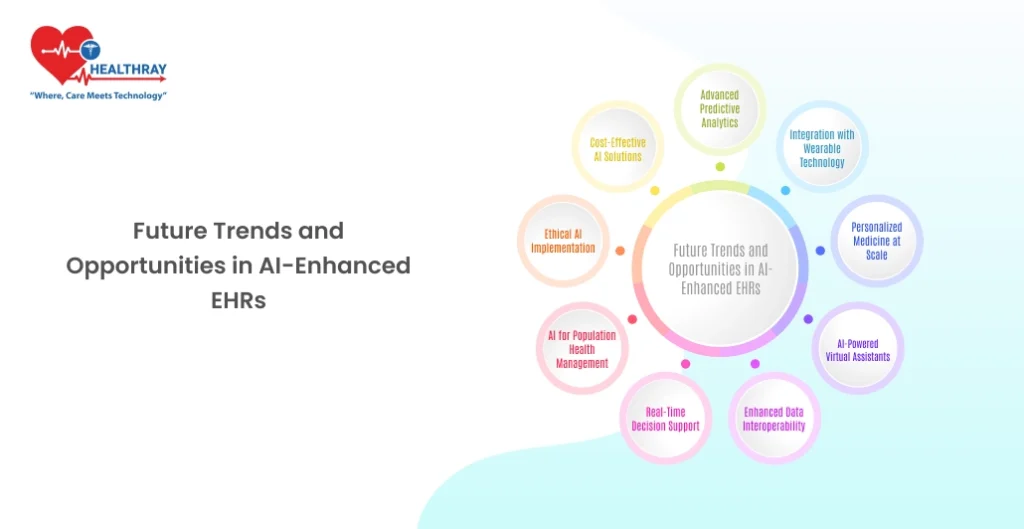
Integration of Artificial Intelligence into Electronic Health Records has just begun. As technology evolves, so does the possibility of AI transforming healthcare in new and exciting ways. Here are some trends and opportunities to watch:
Advanced Predictive Analytics
In the future, this new generation of AI tools will go beyond identifying imminent health risks. Long-term prognosis in chronic diseases would be far more accurate, and much earlier interventions would be possible. For example, AI can predict decades in advance that a person is likely to develop heart disease according to their lifestyle and genetic factors.
Wearables Integration
From smartwatches to fitness trackers, wearables are continuously generating health data. In the future, AI-enhanced EHRs will integrate such information seamlessly for a more holistic view of a patient’s health. This could also further assist clinicians in monitoring progress, observing irregularities, and thereby making necessary adjustments in treatments in near real time.
Personalized Medicine at Scale
AI can bring this vision and change the face of personalized medicine by helping analyze the patient’s genetic makeup in combination with lifestyle and past medical history and recommending treatment options with a focused approach toward individual needs. In this way, personalized care can be extended to a larger population.
AI-powered virtual assistants
AI-powered virtual assistants are assuming an increasingly significant role in health care. Such virtual tools perform a wide range of functions for the clinicians-from retrieving patient information and scheduling follow-ups to reminding them when routine screenings are due. In this way, health professionals can pay more attention to communicating with patients.
Improved interoperability of data
This increased interoperability further allows AI to function across a multitude of systems, collating data from different sources. This gives a holistic view of the patient’s health and helps to achieve better coordination of care and decision-making.
Real-Time Decision Support
Future AI and ehr systems will deliver insight in real time at the point of consultation. For instance, AI might suggest certain diagnostic tests or potential medicine interactions upon scanning a patient’s record in real time for the physician to minimize the chances of overlooking something important.
AI for Population Health Management
AI will also be instrumental in continued analysis at the population level through identification of health trends, prediction of outbreaks, and optimization of resource allocation for public health initiatives, thereby creating opportunities for better healthcare policy and planning.
Ethical AI Implementation
As AI becomes more common, ethical considerations come to the fore. The developers need to create transparent, unbiased AI systems that take responsibility for recommendations made with a view to ensuring patient trust in the technology. Cost-Effective AI Solutions Advancing AI will reduce costs so that these technologies become available to small clinics and practices as well. This democratization of AI-enhanced EHRs will spread their adoption across the healthcare spectrum. The future of AI in EHRs promises some exciting improvements which could go on to further revolutionize the healthcare system. Keeping a tab on these trends will help healthcare professionals, IT specialists, and developers prepare for an even more intelligent and resourceful future.
Conclusion
AI is not just upgrading Electronic Health Records; it is changing the very way healthcare is provided. Automation of tasks, reduction in errors, and offering insights are a few ways in which AI is infusing efficiency and effectiveness into EHR systems. Understanding the use and adoption of AI-enhanced EHRs is thus necessary for healthcare professionals, IT professionals, and developers to stay updated with the pace at which this field is evolving. The spectrum of AI applications in EHRs ranges from improvement of patient care to reduction of workload for clinicians. Though the challenge of interoperability and security-related issues still persists, the EHRs’ benefits outweigh the challenges involved. Integration of AI and Hospital Management system would be an intrinsic part of providing quality healthcare as technology evolves.
